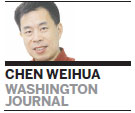 The 2015 US National Military Strategy listed ISIL (Islamic State of Iraq and the Levant), Russia, Iran, the Democratic People's Republic of Korea (DPRK) and China as possible threats, but experts believe many US actions are also seen as a threat in others' eyes.
The 2015 US National Military Strategy listed ISIL (Islamic State of Iraq and the Levant), Russia, Iran, the Democratic People's Republic of Korea (DPRK) and China as possible threats, but experts believe many US actions are also seen as a threat in others' eyes.
The US report, outlined on Wednesday by Chairman of the Joint Chiefs of Staff Martin Dempsey in a press conference, said the US supports China's rise and encourages it to become a partner for greater international security.
"However, China's actions are adding tension to the Asia-Pacific region. For example, its claims to nearly the entire South China Sea are inconsistent with international law," the report said.
It faulted China for responding to the international call to settle the issue cooperatively and without coercion with aggressive land reclamation efforts that will allow it to position military forces astride vital international sea lanes.
But the report also noted that none of these nations named are believed to be seeking direct military conflict with the United States or our allies.
Nonetheless, they each pose serious security concerns which the international community is working to collectively address by way of common policies, shared messages and coordinated action.
The report said the US remains committed to engagement with all nations to reduce the potential of miscalculation.
"We continue to invest in a substantial military-to-military relationship with China and we remain ready to engage Russia in areas of common interest, while urging both nations to settle their disputes peacefully and in accordance with international law," the report said.
Neither China's Ministry of National Defense nor Ministry of Foreign Affairs has so far commented on the report but are likely to in the coming days.
China has long accused the US of hyping a China threat in the South China Sea and called on the US to ditch a Cold War mentality. Many Chinese think the US is biased on the South China Sea issue by deliberately ignoring many more land reclamations and other provocative actions taken by other nations, in particular US allies.
Ted Carpenter, a senior fellow for defense and foreign policy studies at the Cato Institute, said by citing Russia and China as two major security threats, the report exhibits a worrisome inability on the part of US military planners to understand the perspective of other countries.
"China and Russia have ample reason to regard an array of US actions as deeply threatening to their interests," Carpenter said.
He noted that the eastward expansion of the US-led NATO alliance to Russia's border was inherently menacing, and the more recent deployment of troops and sophisticated weaponry to the East European members increases Moscow's perception of a threat. "Washington's so-called pivot of its military forces to East Asia, the growing US involvement in the territorial disputes in the South China Sea, and the Obama administration's unquestioned support of Japan's position in the dispute over the Diaoyu islands in the East China Sea, all likely appear threatening from China's perspective," Carpenter said.
Carpenter believes that the case can be made that Moscow and Beijing could have handled various sensitive issues better, but US actions have hardly been purely defensive and unobjectionable.
"Before US officials criticize the behavior of China and Russia, they would do well to more carefully examine aspects of America's own conduct toward those countries," he said.
US Deputy Defense Secretary Bob Work also pointed to Russia and China as potential threats in a June 22 speech at the China Aerospace Studies Institute based at the Rand Corp in Arlington, Virginia.
Work said if Russia and China are not great powers now, they certainly have the potential to be. "And under any circumstances, they are going to provide us with an enduring and very difficult military challenge, which will stress us," he said.
He also said that this does not mean to suggest that China and the US are doomed to have an overtly hostile relationship. "Indeed, our future relationship, the way we see it, will have elements of cooperation and competition and not open hostility," he said.
He said the Pentagon continues to pursue military-to-military cooperation, confidence-building measures with China.
Douglas Paal, vice-president for studies and director of the Asia Program at the Carnegie Endowment for International Peace, believes there is really nothing new in the 2015 document.
"The portion concerning relations with China reflects existing administration policy of recognizing both cooperation and competition," he said.
"It could have gone farther in its characterization of Chinese policy and behavior in the South China Sea, which I see as another venue for hybrid conflict or war."
China's first white paper on military strategy released in late May reaffirms the country's adherence to peaceful development and its "active defense" military strategy, interpreted as "we will not attack unless we are attacked, but we will surely counterattack if attacked."
The report by China's State Council Information Office mentioned increasing security challenges posed by certain countries, citing the growing US military presence in Asia and major adjustments to Japan's security policies.
chenweihua@chinadailyusa.com